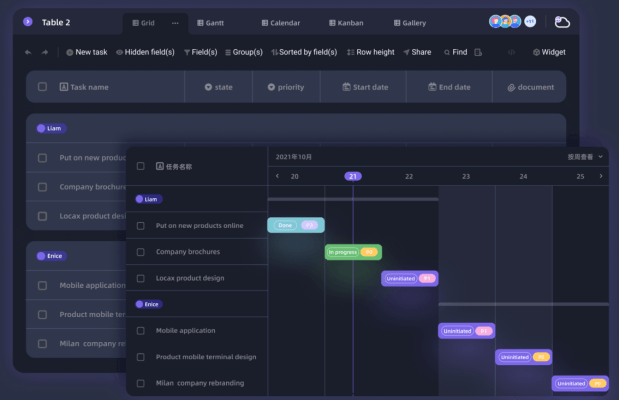Low-code database APITable is another Airtable challenger

Airtable’s whopping $11 billion valuation attained in late 2021 has lured a raft of ambitious entrepreneurs into the low-code database space. They covet even just a small slice of the pie enjoyed by the decade-old American juggernaut. While SaaS has long been a proven business model in the U.S., in emerging markets, and even in China’s burgeoning tech industry, many users still expect software to be free.
To grow their paying customers, Asia’s SaaS startups, built by seasoned and affordable developers, are venturing into the West. Hong Kong-headquartered low-code database APITable is one of them (it’s in the process of setting up a Canadian base). The company is unabashed about its ambition to take on Airtable. Case in point, its blog featured a step-by-step guide on how to migrate from Airtable to its own platform.
APITable is competing with a handful of rising startups, like Amsterdam’s Baserow and San Francisco-based NocoDB, to provide an open source, visual solution for creating smart, sleek-looking databases. Its name suggests a focus on system interoperability. In the future, users will be able to connect the low-code tool to platforms including Zapier, Slack, Google Workspace and red-hot ChatGPT using the APITable API, says the company’s co-founder and COO Gary Li in an interview.
For users wanting an off-the-shelf product that requires minimum technical skills and third-party hosting, the software comes with a paid, premium version. As of today, APITable has been “starred” some 6,500 times on GitHub, an indicator of a project’s popularity amongst developers. While Li declines to disclose the company’s revenue size, he claims that in 2022, “organization users,” including freemium and paid ones, grew from 6,000 to over 20,000 across 30 countries.
APITable’s founding team first tested the water in China. Its Chinese version Vika launched in February 2021 at a time when venture capitalists, buoyed by the boom of Zoom, Stripe, Canva, Figma, Airtable and other cloud-based solutions in the West, were rushing to bet on local alternatives.
APITable itself landed funding from prominent VCs like IDG Capital, GL Ventures (Hillhouse’s early-stage arm), 5Y Capital (which is considered by some as a bellwether in enterprise tech investment in China) and Eminence Ventures. The startup had raised $10 million in total funding as of early 2021 at a valuation of roughly $75 million.
Back in China, Vika has had no shortage of rivals. Companies from giants like ByteDance and Tencent to underdogs like Hipacloud and Treelab clamored to build their answers to Airtable. Looking forward, the parent firm will place more focus on expansion in the West through APITable. “Being open source is a way of marketing itself. To generate revenues, though, we still depend on Saas sales,” reckons Li.
APITable’s CEO Kelly Chan seems to know a thing or two about creating tools for non-technical users. He was previously the CTO at HeyTea, a venture-backed company that revolutionized the bubble tea business in China. The chain not only pioneered the novel cheese-on-the-top flavor but more importantly, it invested heavily in a sizable developer team, a rather unusual move in the food and beverage industry. The results were reassuring. Under Chan’s helm, HeyTea made an app to speed up ordering and shorten wait time as well as boost recurring revenue through a membership scheme.
Update: Added Eminence Ventures as an investor and corrected Vika’s launch date.

